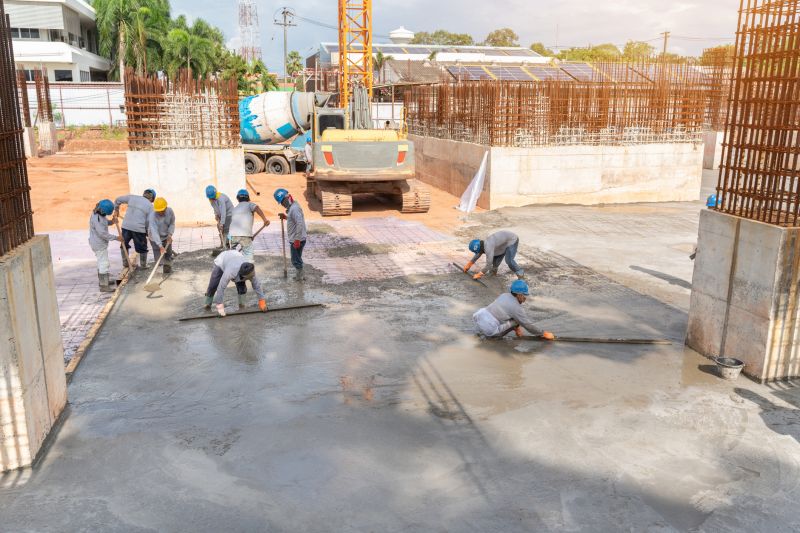Top-Rated Products For Concrete Installation Projects
Browse trusted products designed to improve the quality and efficiency of your concrete installation work.
 Concrete installations are fundamental to a variety of construction and renovation projects in Lawrenceville, GA. From creating durable driveways and sidewalks to setting foundations and decorative features, selecting the right products ensures a successful and long-lasting outcome. The process involves multiple stages, including surface preparation, reinforcement, mixing, pouring, and finishing. Each step requires specific tools and materials to achieve optimal results. Proper selection of these products can help improve efficiency, safety, and the quality of the finished concrete installation.
Concrete installations are fundamental to a variety of construction and renovation projects in Lawrenceville, GA. From creating durable driveways and sidewalks to setting foundations and decorative features, selecting the right products ensures a successful and long-lasting outcome. The process involves multiple stages, including surface preparation, reinforcement, mixing, pouring, and finishing. Each step requires specific tools and materials to achieve optimal results. Proper selection of these products can help improve efficiency, safety, and the quality of the finished concrete installation.
Top Overall Option
Concrete Reinforcement Mesh
A versatile reinforcement mesh provides structural support for various concrete projects, helping to distribute loads evenly and reduce the risk of cracking. It is suitable for slabs, walkways, and driveways, offering durability and ease of installation for both professionals and DIYers.
Types of Products For Concrete Installations
Reinforcement Mesh
Provides structural support to concrete surfaces, helping to prevent cracking and improve longevity.
Concrete Mixers
Essential for thoroughly blending concrete components, ensuring a consistent mixture for pouring.
Form Liners
Create decorative patterns and textures on concrete surfaces for aesthetic enhancement.
Curing Compounds
Help retain moisture in freshly poured concrete, promoting proper curing and strength development.
Sealants and Surface Protectors
Protect concrete surfaces from stains, water damage, and wear over time.
Concrete Vibrators
Remove air bubbles and ensure proper compaction during pouring for a smooth finish.
Expansion Joints
Accommodate movement within concrete slabs, reducing the risk of cracking.
Concrete Trowels and Floats
Assist in leveling and smoothing the surface for a professional finish.
Form Release Agents
Facilitate easy removal of forms after concrete has set without damaging the surface.
Anchor Bolts and Fasteners
Secure structures to concrete foundations, providing stability and support.
Waterproofing Membranes
Prevent water intrusion in below-grade concrete structures.
Fibers and Additives
Improve concrete's crack resistance and workability with various fiber reinforcements.
Concrete Cutting Tools
Assist in precise cutting and modification of hardened concrete surfaces.
Grout and Anchoring Cement
Fill gaps and secure fixtures into concrete surfaces.
Surface Finishing Tools
Enhance the appearance and texture of concrete surfaces through polishing and texturing.
Popular Choices
Widely used for reinforcing concrete slabs, providing added strength for various applications.
Convenient for small to medium projects, enabling on-site mixing for fresh concrete.
Commonly chosen for protecting surfaces from stains and water damage.
Popular for managing movement and preventing cracks in large slabs.
Help achieve level surfaces efficiently during pouring.
Used to retain moisture and ensure proper curing, especially in warm climates.
Preferred for clean form removal and smooth finishes.
Create clean edges and control joints for aesthetic and functional purposes.
Essential for below-grade or exposed concrete installations.
Adding fibers is a common method to enhance concrete durability.
Popular for achieving polished or textured finishes.
Frequently used to secure fixtures and structures to concrete foundations.
Widely employed for precise modifications in hardened concrete.
Additives that improve workability without increasing water content.
Used to measure the consistency or workability of fresh concrete.
Understanding the different types of products available is essential for both DIY enthusiasts and professional contractors. For instance, reinforcement materials like rebar or wire mesh provide structural integrity, while additives can modify setting times and workability. Surface treatments such as sealers and curing compounds help protect the concrete from damage and wear over time. Additionally, tools like mixers, trowels, and screeds are necessary to achieve a smooth, level surface. Knowing which products suit your specific project scope can make the entire process more manageable and effective.
When choosing products for concrete installations, it is important to consider the environment and the specific demands of your project. Factors such as load-bearing requirements, exposure to weather, and aesthetic preferences influence the selection process. Quality materials and reliable tools contribute to the longevity and appearance of the finished work. Proper planning and informed product choices can help prevent common issues like cracking, uneven surfaces, or premature deterioration, ultimately saving time and resources in the long run.
Key Buying Considerations
- Identify the specific application and load requirements of your project.
- Choose products compatible with the environmental conditions, such as exposure to moisture or temperature variations.
- Assess the size and scope of the project to determine the quantity and type of materials needed.
- Prioritize quality and durability to ensure long-term performance of the installation.
- Consider ease of installation and whether specialized tools or skills are required.
- Review product specifications for compatibility with existing materials and methods.
- Evaluate the drying and curing times to coordinate project timelines effectively.
- Check for safety features and proper handling instructions for all products.
- Determine if additional reinforcement or additives are necessary for your project.
- Factor in budget constraints while balancing quality and performance.
- Look for products with reliable sourcing and consistent supply availability.
- Understand the maintenance requirements of the chosen products post-installation.
- Consider environmental factors that might influence product choice, such as UV exposure or chemical contact.
- Verify that products meet relevant industry standards and certifications.
- Plan for proper storage of materials to prevent deterioration before use.
